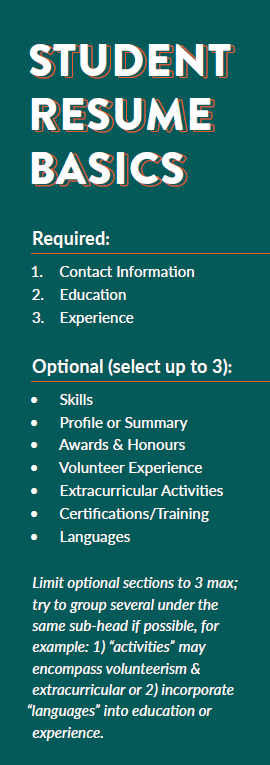- Candidates
- Login
- Set Up Account
- Create a Job Alert
- Search Tools
- Resources
- Employers

Beginner vs. Experienced Resumes
You Google “resume templates” and find document examples full of decades-long work experiences and glowing accomplishments. It’s sometimes daunting for students to build their first resume after viewing experienced professionals’ resumes. You may ask yourself where to start, or if you can even compete.
Get your confidence in check, because there are a few very striking differences and expectations between beginner and experienced resumes. Students can really stand out with several resume techniques.
Bill Baker, Talent & Culture Programs Lead for J.R. Simplot Company shared a positive aspect about new grads, “They typically don’t have bad workplace behaviors engrained yet; oftentimes more experienced workers know how to do one thing very well, but lack breadth.” He recommends, “Students showcase the variety of things they’ve done to learn new technologies and keep their skills sharp.”
Whereas professional resumes focus on work experiences and accomplishments, student resumes focus on education and skill development.
Length
Concise, to-the-point, and easily readable are vital characteristics for every resume, no matter your career stage. One-page resumes are recommended for those building their first resume, entry-level applicants, students, and recent graduates. If your resume spills over onto a second page, immediately think TMI. Cut the fluff, unnecessary filler words, and irrelevant information.
Education
Education is front and center on the student or new grad resume and appears near the top. “Students and recent graduates should include their GPA if it’s above 3.0,” said Tom Heady, Leader – Campus Recruiting at Elanco Animal Health. “If a student leaves GPA off their resume, it can be misinterpreted as not good,” added Heady.
On the other hand, there’s no need to advertise a GPA below 3.0, so keep it off. You may also include your major GPA if it’s likely to impress. Required resume data includes expected or actual graduation date, degree(s), and school. You may also add areas of concentration and special recognition.
Traditional students may not possess extensive work histories, but classes also provide experience. Baker recommends that students, “Show projects and topics learned, not just your degree.”
“Relevant coursework or projects that align to the role you’re applying for are crucial for students,” added Baker. Feature key courses and upper-level major-related classes that relate to the desired career pathway.
In contrast, experienced professionals shift their resume education section toward the bottom of their resume and omit GPA, specific classes, and maybe even the graduation year.
Experience
After you’ve been in the work world for a few years, the experience section really takes over most of the resume. Experienced professionals feature their experiences in reverse chronological order (most recent first) and typically omit high school or college jobs.
However, part-time or summer jobs are often the bulk of experiences students can share. How do young professionals illustrate their valuable experiences in a resume? Filling in this section of the resume can be the most intimidating part for students.
Certainly, highlight any work and internships related to your field of study and/or the potential job. All work experiences, no matter how inconsequential they seemed at the time, help you build valuable employability soft skills transferable to full-time work after college. “There are two ways to describe these jobs; sticking to the basics by minimizing the experience, or going beyond to expand on what value you added to the organization,” noted Heady.
Those high school work and part-time jobs in college such as babysitting, food service, family farm, retail, or pet sitting illustrate your work ethic, flexibility, attention to detail, willingness to learn, prioritization, customer service, communication, and time management skills.
Students can also emphasize language fluency and certifications. Reference certifications you’ve obtained that are above and beyond requirements for your field of study, such as an occupational safety certificate, CDL, A+ certification, or project management certificate.
Students shouldn’t perceive their limited experiences as a lack of skills; many students could teach master classes in balancing multiple commitments between the classroom, homework, and projects, extracurricular activities, volunteering, and family commitments, plus searching for an internship or job.
Collegiate study abroad opportunities also build students’ experience section, illustrating the understanding of global and diverse issues, language, and willingness to explore.
Achievements
Employers expect experienced professionals to go beyond listing duties on a resume and focus on accomplishments with quantifiable results. Students don’t have years of on-the-job achievements to promote in their resume. However, students may weave recent and timely involvement with organizations and associations into their resume experience and skills sections. Heady advises students that, “Most recent is most relevant.” Baker agrees that students should only list high school achievements if they’re relevant.
“One of the most important characteristic we look for in a student resume is leadership potential,” said Heady. This is illustrated by students that have had leadership roles in school, specifically elected roles. “If students will practice their leadership skills on campus, we believe that they will more likely tackle a leadership role at our company,” added Heady. Baker echoed the importance of conveying leadership skills on a resume, “Holding roles in student organizations where they’ve demonstrated leadership capabilities makes a student’s resume stand out.”
Accomplishments from volunteer involvement (especially measurable achievements) are ideal student resume builders. Students can enhance their resume with extracurricular and leadership work. Go beyond club membership and volunteerism to highlight the leadership roles you’ve taken on for these organizations. This involvement showcases your passions and how you give back.
The student or new graduate resume is often one of your last chances to brag about scholarships, honor societies and programs, and student awards. Take advantage of the opportunity to emphasize your student achievements as resume builders; get a few years under your belt and these student awards are no longer applicable, nor appropriate.
